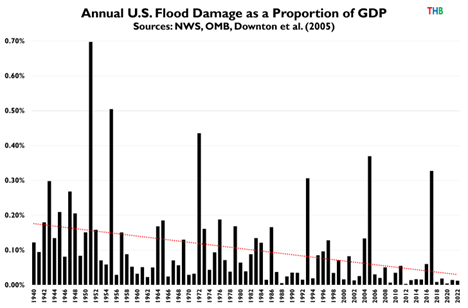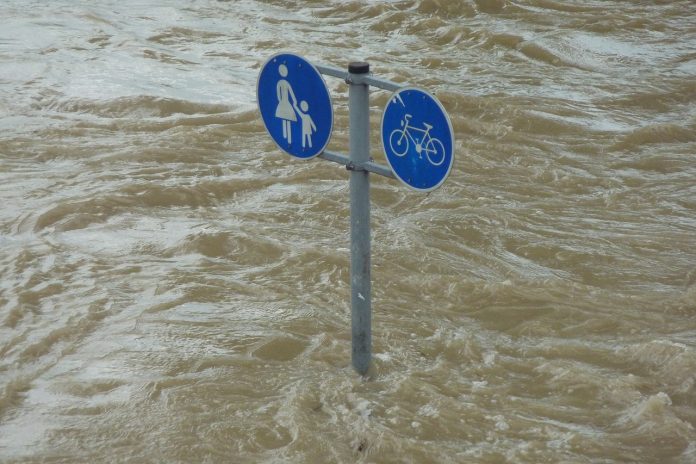A recent post at The Conversation claims that flooding is getting worse in the United States due to climate change, calling for a change in water handling philosophy in order to mitigate the effects. The author overstates scientific confidence in the connection between flooding and the modest warming of the past century. Data does not show flooding is becoming more frequent or severe. Having said that updating water handling in major urban areas would help with mitigating flooding, although it is unclear whether the method proposed in the Conversation’s article is feasible.
The article, “As climate change amplifies urban flooding, here’s how communities can become ‘sponge cities’,” is written by an engineering professor and director of a water resource laboratory at Drexel University, Franco Montalto. He begins the post by asserting that in the United States, “intense single-day precipitation events are growing more frequent, fueled by warming air that can hold increasing levels of moisture.”
The citation Montalto uses goes to the U.S. government’s Fifth National Climate Assessment (NCA5) report, which has been heavily critiqued by scientists for directly ignoring or contradicting available scientific literature on the subjects it covers. Climate Realism previously pointed out deceptive framing from the NCA5 on its approach to temperature extremes here, and the alleged increase in so-called “billion dollar disasters” here. The NCA has become a political tool that is distinctly partisan, directly controlled by whatever presidential administration is currently in charge. The publications reflect that reality.
When the NCA5 was first released, climate scientist and past contributor to the NCA reports Roger Pielke Jr. pointed out that it was strange for an alleged scientific assessment to contain so many citations that pointed to White House press releases. Regarding the actual science, the NCA contradicts the most recent Intergovernmental Panel on Climate Change findings on flooding, which admit only low confidence in even a sign of change in any direction, positive or negative.
The U.N. Intergovernmental Panel on Climate Change, in fact, has warned against trying to associate changes in precipitation to human activities and flooding, because flooding is complex and very situationally dependent:
“Attributing changes in heavy precipitation to anthropogenic activities (Section 11.4.4) cannot be readily translated to attributing changes in floods to human activities, because precipitation is only one of the multiple factors, albeit an important one, that affect floods.”
What’s more, despite a modest increase in overall precipitation, annual U.S. flood damage as a proportion of GDP has declined over time, not increased. (See figure below)

As with many recent posts connecting climate change and particular threats to infrastructure, the majority of the Conversation’s piece doesn’t dwell on climate change at all, but rather on Montalto’s research into “green infrastructure” and water handling systems for urban areas. In this case, his focus is on “sponge cities” – city planning that involves using green spaces and planted rooftops to soak up runoff and filter water before it reaches rivers and streams.
This all sounds fine and may well be a valuable response to the fact that development, such as impervious surfaces, gutters flowing into streams, wetland and open space conversion, and channelization of streams in urban areas and suburban areas are contributing to increased runoff and associated flooding. The issue with the proposal for “sponge cities” is not so much the theory of it, but as admitted by the author, the practicality of “transforming” cities in this way.
As Montalto himself writes, “critics say this level of greening is not technically, logistically or socially feasible.” He dismisses these concerns by glibly commenting that, if sponge cities are to exist, “cities will eventually have to figure out how to get there,” and goes no further into debating the criticism.
As cities grow, the issue of flooding naturally grows with it as sewers become overburdened and even more land is used for construction, unless infrastructure is updated and expanded. Improving water handling infrastructure in cities makes sense regardless of climate change. Evidence does not provide justification for Montalto to mention climate change as a causal factor in exacerbating flooding, unless the he just wanted to piggy-back his planning and development ideas onto climate alarm to get a wider hearing for his proposed solutions.















